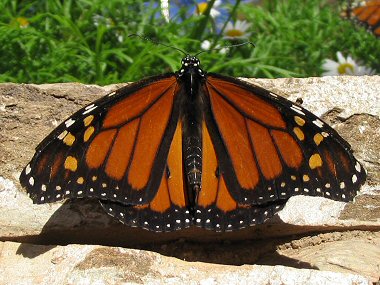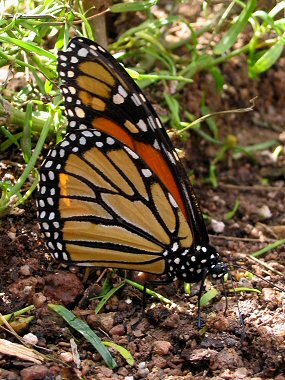Monarch Butterflies are a large orange
and black butterflies with wingspans of 3 - 4.5 inches. They are
sometimes referred to as 'milkweed' butterflies, since the larvae feed
exclusively on this plant. Adult female monarchs lay their eggs on the
underside of milkweed leaves in the spring. These eggs typical hatch in
three to twelve days producing a larvae which feed on the milkweed
leaves for about two weeks and develop into yellow, black and white
striped, two inch long caterpillars. The milkweed contains a poison that
makes the monarchs taste bad to birds and other predators, which soon learn to
avoid them. Caterpillars eventually form a shiny green and gold speckled
chrysalis. The adult monarch emerges from the chrysalis about two weeks
later.
the monarchs taste bad to birds and other predators, which soon learn to
avoid them. Caterpillars eventually form a shiny green and gold speckled
chrysalis. The adult monarch emerges from the chrysalis about two weeks
later.
|
Tagged monarchs have been
documented as flying as much as an 1870 mile long migration route
(point to point distance, which doesn't take into account that
fact that butterflies don't fly in a straight line). |
As the weather becomes colder, millions of monarchs
begin their annual migration south to fir forests in the mountains of
central Mexico where they spend the winter. Other monarchs will migrate
west to the central and southern California coast. In the spring the
monarchs make the long flight back north and lay eggs along the way.
When the eggs hatch into caterpillars, the whole cycle begins once more. |

